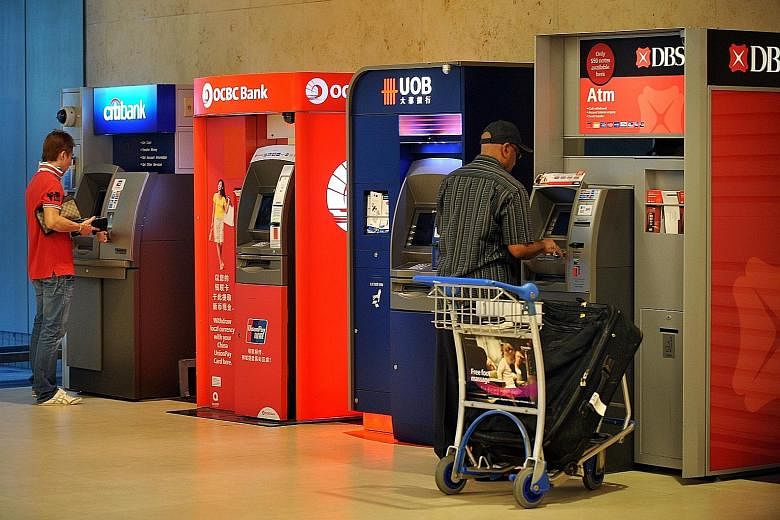The deadly dull process of crunching data, vast screeds of it, is proving a major blessing for local banks as they work the high-tech angle to improve automated teller machine (ATM) operations and other services. Data generated by ATMs is proving to be especially useful.
Transaction logs show withdrawal times and the number of bills dispensed, so banks know when to refill the ATMs and where there might be heavier usage, such as in Orchard Road during Christmas.
Banks also use data from GPS-enabled mobile phones to identify places frequented by many people and assess these hot spots as possible sites for ATMs, said Mr Tan Shong Ye, PwC Singapore's information technology and data risk leader.
These efforts reap cost savings.
DBS said data analysis has cut instances where ATMs run out of cash by over 90 per cent, and recovered the costs involved in this exercise in 18 months.
The number of trips required to reload the network of ATMs was reduced by 10 per cent.
The sources of information that banks use look set to rise.
They are keen on acquiring travel data from bus and phone companies to ascertain travel patterns and where peak traffic occurs, said Mr Bill Padfield, chief executive of Dimension Data Asia Pacific, an IT solutions and services company.
"Most countries link the bus pass to their identity card, so (bus companies) actually understand who's getting on and off the buses, when they're getting on and off the buses, what age they are and what sex they are."
Such information can help banks assess where they should set up branches and when they will need the most staff, added Mr Padfield.
Getting the data is one thing, analysing it is another, given the technical challenges.
Many bank systems that collect information in areas like loans, ATMs and so on are not interconnected.
But once they are linked up, banks could "strip-mine raw data to see all kinds of new correlations between different things that they can never see before", Mr Padfield said.
The benefits can be extensive.
A bank could gather enough information about a client using an ATM to target advertisements at him or her.
For example, the system might detect that the customer has not had a car loan in five years but used to change cars in December, so the ATM could display a promotion for a cheaper vehicle loan, Mr Padfield said.
Banks could also learn about customer preferences by "accumulating... transaction data and behavioural data obtained from the clicks and timing of clicks of the customers' Internet or mobile banking transactions", says PwC's Mr Tan. This will indicate a person's preferences and risk profile, which helps the bank tailor personalised investment plans.
Banks can also analyse account activity to customise the number of free cheques they offer a customer, said Mr Lyon Poh, head of digital and innovation at KPMG in Singapore. "Personalised banking products are expected to play a key role in attracting and retaining the most profitable customers," he added.
Accumulating so much data on people does raise privacy risks, said Mr Padfield, who added that security will become more important.
Tighter laws curbing companies from collecting and selling customer data to banks due to privacy concerns are another possible hitch.
Different countries might enact varying forms of legislation, and these would affect businesses and consumers differently.
Mr Padfield noted: "So if this country gets that (legislation) right from a sales point of view, I could invest a ton of money there, which is great, but you as a consumer may feel it's wrong and so on."

